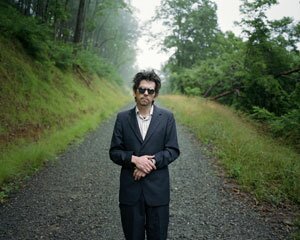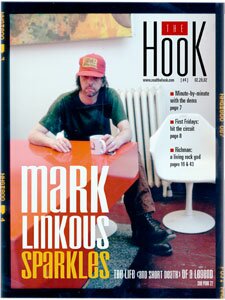CULTURE- <i>Light Years</i> later: Linkous back after five years
When the Hook first met longtime indie rock favorite Mark Linkous at his house in the Fluvanna village of Bremo Bluff back in February of 2002, the man behind the band Sparklehorse was "immensely talented and voluntarily haunted." He said he found in music "a release that gives the world a glimpse into his ever-churning mind."
As it turns out, the haunting may not have been voluntary, as his mind was busy churning through a losing battle with depression. Now, Linkous tells the Hook that not long after that interview, he stopped writing music altogether, and often woke up disappointed that he was still alive.
"It seems that in the past, whenever I was playing gigs, I would be teetering on the edge of collapse all the time," says Linkous. "Sometimes the people in the audience want to see that collapse happen, and maybe they're disappointed.
"It's nice to have some confidence," says the Albemarle High School alum, who credits his rebound to a recent move to a mountaintop in southwest North Carolina and to starting an unlikely partnership with hip-hop's hottest DJ.
His recovery was tested this New Year's Day when Sparklehorse drummer Johnny Hott found their mutual friend Bryan Harvey's Richmond home on fire, and police discovered that Harvey and his family had been brutally slain.
The combination of rebirth and sadness is noticeable on Dreamt for Light Years in the Belly of a Mountain, his first Sparklehorse record in five years released last month.
The Hook spoke with Linkous by phone after his show at the Stanley Theatre in Liverpool, England.
The Hook: We've learned that when we last talked, you were in the middle of your struggle with depression. How has your life changed since then?
Mark Linkous: That's one of the reasons it's taken so long to do this record. It got bad again, and that accounted for a good three years or more. I'm feeling better now, being out on the road, and my best friend for 20 years, Johnny Hott, is playing drums with me.
The Hook: How is the writing and recording on this album different from what you've done before?
Mark Linkous: More laborious. I had to force myself to write, because I'd lost interest for so long. When I did finish a song, I liked sitting around and playing it on my guitar and letting it go. I thought recording it ruined it.
The Hook: What made you decide to go back into the studio?
Mark Linkous: Well, I stopped working for so long that I couldn't pay my rent. It began as a survival instinct. The music I had in my head– I wasn't sure that could be articulated to tape. I started talking to Danger Mouse [Gnarls Barkley, Gorillaz] about wanting to bring more electronic stuff to this record, and he's the Jimi Hendrix of the laptop computer. I got excited working with him. One thing I'd been doing was listening to later Beatles, and when I heard The Grey Album [Danger Mouse's amalgam of Jay-Z's The Black Album and the Beatles' White Album], I guess it was just the right time.
The Hook: Danger Mouse has said people take artists seriously only when they think they're insane. True?
Mark Linkous: That may be true in people's inate morbid curiosity. The first time I heard Daniel Johnston's music, I loved it, and when I talked about him, I'd mention to people he was a manic depressive. It's a weird human thing; people are just drawn to that.
The Hook: What made you move to North Carolina?
Mark Linkous: I had lost interest in music and was not feeling well. It was just escaping from Virginia, running away, and I accidentally found this area in North Carolina that I loved. In Virginia, there had been lots of droughts, and the land was drying up. People were clear-cutting, demolishing the countryside. I found the mountains in North Carolina were really tall, and when it rained and then the sun came out, you'd have fog on the Smokies.
The Hook: Have you been back?
Mark Linkous: A couple times, just for a few days at a time.
The Hook: Visiting friends?
Mark Linkous: Unfortunately, mostly funerals.
The Hook: Whose funerals?
Mark Linkous: Just friends.
The Hook: I'd heard one of them was Bryan Harvey. What was your relationship like with him?
Mark Linkous: I hadn't seen him in a long time, but we were close a long time ago. I don't really want to talk about Bryan.
The Hook: Fair enough. This is the second album that features you working with Tom Waits. What have you learned from him?
Mark Linkous: I guess I tried to make records that sound as interesting as his Island records. Swordfishtrombones, Rain Dogs– they sound completely iconic, and that's what I've wanted to do from the bginning, make pop-based records that are as interesting as his blues-based records.
The Hook: How do you feel about people thinking of you as a dark, brooding artist?
Mark Linkous: I guess they just draw conculsions from my music. I think that maybe the majority of the people in America– it's changing now, but for a while– thought that's all my music was because they saw it in a superficial way. That's not so much the opinion in the UK and in Europe.
The Hook: How is it different over there?
Mark Linkous: They see it as hopeful, and they see that sadness doesn't have to be terrible all the time.
The Hook: Between touring with Radiohead in 1996, and working with Danger Mouse 10 years later, it seems that people's careers take off after working with you while you remain beloved by a devoted group of fans, but relatively obscure. How do you feel about that?
Mark Linkous: I never thought about it. I just want to be able to live and pay my rent and be able to go to the dentist, and buy new shoes when my old shoes wear out.

Mark Linkous now calls North Carolina home.
PHOTO BY TIM SACCENTI

When he still lived in Fluvanna, Linkous was one of the Hook's first cover subjects in 2002.
FEBRUARY 28, 2002 HOOK COVER
#